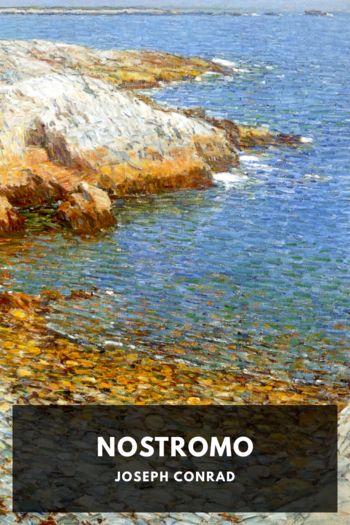Nostromo - Joseph Conrad (books to read fiction .TXT) 📗

- Author: Joseph Conrad
Book online «Nostromo - Joseph Conrad (books to read fiction .TXT) 📗». Author Joseph Conrad
During the night the expectant populace had taken possession of all the belfries in the town in order to welcome Pedrito Montero, who was making his entry after having slept the night in Rincon. And first came straggling in through the land gate the armed mob of all colours, complexions, types, and states of raggedness, calling themselves the Sulaco National Guard, and commanded by señor Gamacho. Through the middle of the street streamed, like a torrent of rubbish, a mass of straw hats, ponchos, gun-barrels, with an enormous green and yellow flag flapping in their midst, in a cloud of dust, to the furious beating of drums. The spectators recoiled against the walls of the houses shouting their “Vivas!” Behind the rabble could be seen the lances of the cavalry, the “army” of Pedro Montero. He advanced between señores Fuentes and Gamacho at the head of his llaneros, who had accomplished the feat of crossing the paramos of the Higuerota in a snowstorm. They rode four abreast, mounted on confiscated campo horses, clad in the heterogeneous stock of roadside stores they had looted hurriedly in their rapid ride through the northern part of the province; for Pedro Montero had been in a great hurry to occupy Sulaco. The handkerchiefs knotted loosely around their bare throats were glaringly new, and all the right sleeves of their cotton shirts had been cut off close to the shoulder for greater freedom in throwing the lazo. Emaciated greybeards rode by the side of lean dark youths, marked by all the hardships of campaigning, with strips of raw beef twined round the crowns of their hats, and huge iron spurs fastened to their naked heels. Those that in the passes of the mountain had lost their lances had provided themselves with the goads used by the campo cattlemen: slender shafts of palm fully ten feet long, with a lot of loose rings jingling under the ironshod point. They were armed with knives and revolvers. A haggard fearlessness characterized the expression of all these sun-blacked countenances; they glared down haughtily with their scorched eyes at the crowd, or, blinking upwards insolently, pointed out to each other some particular head amongst the women at the windows. When they had ridden into the plaza and caught sight of the equestrian statue of the King dazzlingly white in the sunshine, towering enormous and motionless above the surges of the crowd, with its eternal gesture of saluting, a murmur of surprise ran through their ranks. “What is that saint in the big hat?” they asked each other.
They were a good sample of the cavalry of the plains with which Pedro Montero had helped so much the victorious career of his brother the general. The influence which that man, brought up in coast towns, acquired in a short time over the plainsmen of the republic can be ascribed only to a genius for treachery of so effective a kind that it must have appeared to those violent men but little removed from a state of utter savagery, as the perfection of sagacity and virtue. The popular lore of all nations testifies that duplicity and cunning, together with bodily strength, were looked upon, even more than courage, as heroic virtues by primitive mankind. To overcome your adversary was the great affair of life. Courage was taken for granted. But the use of intelligence awakened wonder and respect. Stratagems, providing they did not fail, were honourable; the easy massacre of an unsuspecting enemy evoked no feelings but those of gladness, pride, and admiration. Not perhaps that primitive men were more faithless than their descendants of today, but that they went straighter to their aim, and were more artless in their recognition of success as the only standard of morality.
We have changed since. The use of intelligence awakens little wonder and less respect. But the ignorant and barbarous plainsmen engaging in civil strife followed willingly a leader who often managed to deliver their enemies bound, as it were, into their hands. Pedro Montero had a talent for lulling his adversaries into a sense of security. And as men learn wisdom with extreme





Comments (0)